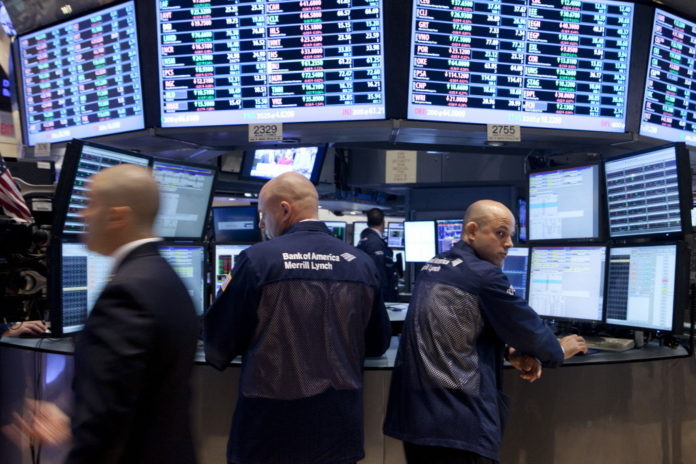
NEW YORK – U.S. stock-index futures fell, indicating the Standard & Poor’s 500 Index will extend its biggest quarterly drop since 2008, after reports from China and Germany fueled concerns the global economy is slowing.
Caterpillar Inc., the world’s largest construction and mining-equipment maker, slipped 1.3 percent as companies most tied to economic growth slumped. Exxon Mobil Corp. decreased 0.7 percent as oil headed for the biggest quarterly decline in New York since 2008. JPMorgan Chase & Co. lost 1.1 percent, pacing declines in financial stocks. Micron Technology Inc. slid 8 percent after reporting an unexpected fourth-quarter loss.
S&P 500 futures expiring in December retreated 1.2 percent to 1,142.30 at 8:49 a.m. New York time. Dow Jones Industrial Average contracts fell 123 points, or 1.1 percent, to 10,976.
“Those concerns are very much alive,” Veronika Pechlaner, who helps manage about $1.8 billion at Jersey, Channel Islands- based Ashburton Ltd., said in a telephone interview, referring to a slowdown in economic growth. “Now we’re going through the process of really finding out how bad it’s going to be.”
The S&P 500 yesterday rose 0.8 percent as lower-than- estimated claims for unemployment benefits helped offset losses in consumer and technology shares. The index is heading toward its fifth monthly loss, the longest falling streak since March 2008. The U.S. equity gauge has tumbled 12 percent this quarter, poised for the biggest three-month drop since December 2008, amid increasing concern Europe’s debt crisis will trigger a global recession. The index is down 7.7 percent for the year.
Consumer Spending
U.S. equities maintained losses after a Commerce Department report in Washington showed consumer spending in the U.S. slowed last month as growing pessimism and a lack of jobs restrained the biggest part of the economy. Purchases rose 0.2 percent, matching the median estimate of 81 economists surveyed by Bloomberg News, after a revised 0.7 percent gain in July. The figures also showed incomes fell 0.1 percent, missing economists’ projection of an 0.1 percent increase.
A report at 10 a.m. New York time may show the Institute for Supply Management-Chicago Inc.’s business barometer eased to 55 this month from 56.5 in August, according to the median forecast of economists surveyed. Readings greater than 50 signal growth. The University of Michigan’s final confidence index for the month was probably 57.8, unchanged from a preliminary reading issued two weeks ago and up from 55.7 in August, the lowest since November 2008.
China Manufacturing
Stocks worldwide fell after a report showed a gauge of Chinese manufacturing shrank for a third month, the longest contraction since 2009, as measures of new orders and export demand declined. The reading of 49.9 for the September purchasing managers’ index, released by HSBC Holdings Plc and Markit Economics today, was unchanged from August and compared with a preliminary 49.4 figure published last week. The gauge was below 50, the level that separates expansion from contraction, for eight months through March 2009.
In Germany, retail sales declined the most in more than four years in August as concerns about the economic impact of Europe’s sovereign debt crisis sapped consumers’ willingness to spend. Sales, adjusted for inflation and seasonal swings, slumped 2.9 from July, when they rose 0.3 percent, the Federal Statistics Office in Wiesbaden said. That’s the biggest drop since May 2007. Economists forecast a 0.5 percent decline, according to the median of 18 estimates in a Bloomberg survey.
European Inflation
U.S. futures extended declines earlier after European inflation unexpectedly accelerated to the fastest in almost three years. The euro-area inflation rate jumped to 3 percent this month from 2.5 percent in August, the European Union’s statistics office said. That’s the biggest annual increase in consumer prices since October 2008.
Cyclical stocks, or companies most tied to economic growth, declined. Caterpillar slid 1.3 percent to $74.43, while General Electric Co. lost 1.5 percent to $15.63.
Exxon Mobil dropped 0.7 percent to $73.34, as the price of oil headed for the biggest quarterly loss since the 2008 financial crisis as signs of slowing growth heightened concerns that fuel demand will suffer.
UBS AG dropped 5.1 percent to $11.88. Lawmakers in Bern, Switzerland, backed proposals to limit risk-taking after the largest Swiss bank said this month it may be unprofitable in the third quarter after a $2.3 billion loss from unauthorized trading at its investment bank.
Banks Decline
JPMorgan declined 1.1 percent to $31.04, while Bank of America Corp. fell 1.4 percent to $6.26. Financial companies in the S&P 500 have sunk 20 percent this quarter, the second- biggest decline among 10 major industry groups.
Micron Technology slid 8 percent to $5.40. The largest U.S. maker of computer-memory chips reported an unexpected loss of 14 cents a share for the fourth quarter on weak demand for personal computers. Analysts projected a profit of 2 cents a share, according to data compiled by Bloomberg.
Ingersoll-Rand Plc declined 13 percent to $27.97. The company that makes products such as Club Car golf cars and Schlage locks forecast third-quarter earnings to be no more than 80 cents a share, below an earlier prediction of at least 85 cents and missing the average analyst estimate of 92 cents.











